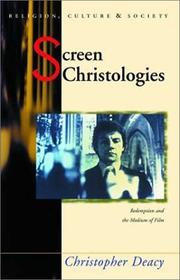| Listing 1 - 4 of 4 |
Sort by
|
Book
ISBN: 1003248292 1003248292 1000613240 Year: 2023 Publisher: Abingdon, Oxon, England ; New York, New York : Routledge,
Abstract | Keywords | Export | Availability | Bookmark
 Loading...
Loading...Choose an application
- Reference Manager
- EndNote
- RefWorks (Direct export to RefWorks)
"This book explores the representation of the idea or theme of redemption in contemporary, popular film. The discussion focuses primarily on the work of three directors - Clint Eastwood, Martin Scorsese and Kore-eda Hirokazu - but also considers a number of films from other directorial hands. David Rankin divides the notion of personal redemption into transactional and transformational aspects, differentiating between redemption understood as that which is external to the person but impacting on their being and environment, and that which is internal to the person. Redemption is viewed broadly as a journey from brokenness to wholeness, from imprisonment to release, or from some form of slavery to freedom. Both secular and religious (especially Christian) understandings of the notion are discussed and consideration is given to how the former might inform the latter"--
Redemption in motion pictures. --- Eastwood, Clint, --- Scorsese, Martin --- Koreeda, Hirokazu, --- Criticism and interpretation.
Book
ISBN: 1498203140 9781498203142 9781498203135 1498203132 Year: 2015 Publisher: Eugene, Oregon : Cascade Books,
Abstract | Keywords | Export | Availability | Bookmark
 Loading...
Loading...Choose an application
- Reference Manager
- EndNote
- RefWorks (Direct export to RefWorks)
What if we ask questions concerning sin and redemption outside of the religious or theological milieu? After all, ""sin"" functions something like religious code language for that which is problematic in human existence. But all humans deal with our fragility and our penchant for harming ourselves or others, and all humans seek to resolve these issues. Might the religious community learn from those outside our gates? Accordingly, in this book a theologian seeks to gain insight from the way seven outstanding filmmakers of our time set up the problems of human existence and seek to resolve them
Redemption in motion pictures. --- Motion pictures --- Christianity and culture. --- Contextualization (Christian theology) --- Culture and Christianity --- Inculturation (Christian theology) --- Indigenization (Christian theology) --- Culture --- Religion and motion pictures --- Religious aspects.

ISBN: 070831712X 0708317138 Year: 2001 Publisher: Cardiff : University of Wales Press,
Abstract | Keywords | Export | Availability | Bookmark
 Loading...
Loading...Choose an application
- Reference Manager
- EndNote
- RefWorks (Direct export to RefWorks)
791.43:2 --- 791.43:2 Film en religie. Film en godsdienst --- Film en religie. Film en godsdienst --- Redemption in motion pictures. --- Motion pictures --- History. --- Redemption in motion pictures --- Cinema --- Feature films --- Films --- Movies --- Moving-pictures --- Audio-visual materials --- Mass media --- Performing arts --- Religious aspects&delete& --- Christianity --- History and criticism --- Religious aspects
Book
ISBN: 0231537301 9780231537308 Year: 2014 Publisher: New York, NY : Columbia University Press,
Abstract | Keywords | Export | Availability | Bookmark
 Loading...
Loading...Choose an application
- Reference Manager
- EndNote
- RefWorks (Direct export to RefWorks)
William Rothman argues that the driving force of Hitchcock's work was his struggle to reconcile the dark vision of his favorite Oscar Wilde "e, "Each man kills the thing he loves," with the quintessentially American philosophy, articulated in Emerson's writings, that gave classical Hollywood movies of the New Deal era their extraordinary combination of popularity and artistic seriousness. A Hitchcock thriller could be a comedy of remarriage or a melodrama of an unknown woman, both Emersonian genres, except for the murderous villain and godlike author, Hitchcock, who pulls the villain's strings-and ours. Because Hitchcock believed that the camera has a murderous aspect, the question "What if anything justifies killing?," which every Hitchcock film engages, was for him a disturbing question about his own art. Tracing the trajectory of Hitchcock's career, Rothman discerns a progression in the films' meditations on murder and artistic creation. This progression culminates in Marnie (1964), Hitchcock's most controversial film, in which Hitchcock overcame his ambivalence and fully embraced the Emersonian worldview he had always also resisted.Reading key Emerson passages with the degree of attention he accords to Hitchcock sequences, Rothman discovers surprising affinities between Hitchcock's way of thinking cinematically and the philosophical way of thinking Emerson's essays exemplify. He finds that the terms in which Emerson thought about reality, about our "flux of moods," about what it is within us that never changes, about freedom, about America, about reading, about writing, and about thinking are remarkably pertinent to our experience of films and to thinking and writing about them. He also reflects on the implications of this discovery, not only for Hitchcock scholarship but also for film criticism in general.
Redemption in motion pictures. --- Motion pictures --- Hitchcock, Alfred, --- Emerson, Ralph Waldo, --- Imarsana, Rāfa Vālḍō, --- Emerson, R. W. --- Emerson, Waldo, --- Emerson, R. Waldo --- Ėmerson, Ralʹf Uoldo, --- Ai-mo-sheng, --- Emarsan̲, --- אמרסון, רלף ולדו, --- עמערסון, ראלף וואלדא, --- Chitskok, Alphrent, --- Hīchakāk, Al-Frad , --- Hitchcock, Alfred Joseph, --- Hsi-chʻü-kʻao-kʻo, --- היצ'קוק, אלפרד, --- هيچکاک، الفرد، --- Criticism and interpretation. --- Influence. --- Hitchcok, Alfred
| Listing 1 - 4 of 4 |
Sort by
|

 Search
Search Feedback
Feedback About
About Help
Help News
News